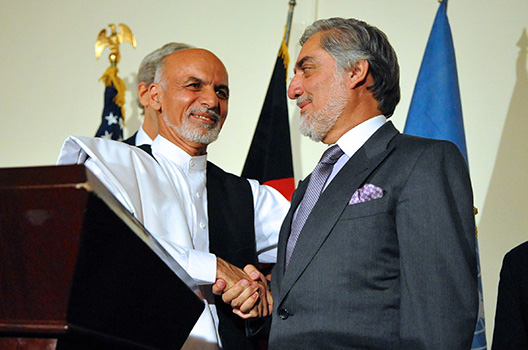 Afghanistan may have reached a critical turning point this weekend with the announcement of Dr. Ashraf Ghani as the country’s next president under a power-sharing agreement with his rival, Dr. Abdullah Abdullah.
Afghanistan may have reached a critical turning point this weekend with the announcement of Dr. Ashraf Ghani as the country’s next president under a power-sharing agreement with his rival, Dr. Abdullah Abdullah.
But it may be a long, slow turn, unless the candidates’ followers also support the idea that a mixed government can dovetail the various factions. Secretary of State John Kerry can take pride in having pulled off a near-miracle after making nearly thirty phone calls to both sides and two visits to Afghanistan since the bitterly disputed runoff election in June.
Still, the real kudos go to the two candidates, who set aside personal ambitions for the common good of their country and its people. Donor nations will be following this transition carefully to ensure that their promised investment in the future stability and growth of Afghanistan as a regional hub of economic activity is secure.
Ashraf Ghani, who came from behind in the first round, pulled off a sizable win (if early reports of the election commission’s final counts are to be believed), thereby providing him the chance to implement his well-crafted economic plans. More importantly, the presidency offers him the opportunity to reshape relations with neighbors, especially Iran, Pakistan, and the Central Asian states. India will play a major role, particularly in how it can build ties with Pakistan to position Afghanistan as a direct trading partner and a way station for the flow of energy from Central Asia and Iran into India itself.
Ghani, a long-time World Bank economist, served for years on the Atlantic Council’s International Advisory Board (a position that he and the Council formally ended with the official declaration of his election as president). In 2009, he produced a ten-year economic framework for Afghanistan (published by the Council’s South Asia Center). Many elements of that plan remain to be implemented. Now is his chance to do just that. He listed rule of law, public finance, human capital development, and accountability among the “first-order functions.”
The “second-order functions” included market building, sustainable jobs, especially for youth, agriculture, mining, and construction as key to the country’s development. All these depend on establishing sound infrastructure, prudent public borrowing, and a long-term human capital development plan. His biggest challenge will be security and reconciliation with the Taliban.
President-elect Ghani will need all the help he can get from within Afghanistan, the region, and donor nations. If he can provide accountability, reduce corruption, and work things out with his one-time rivals, Afghanistan could become a beacon of hope in a very tough neighborhood.
The fears of Afghanistan fatigue in the West are realistic. But the dangers of not doing enough to help Afghanistan succeed in this critical transition are also real. It is time to reinvest in Afghanistan.
Shuja Nawaz is the director of the South Asia Center at the Atlantic Council.
Image: Ashraf Ghani, left, and Abdullah Abdullah shake hands July 12 after agreeing on a process to resolve their dispute over issues of fraud and vote-counting in the presidential election. (US State Department photo)
